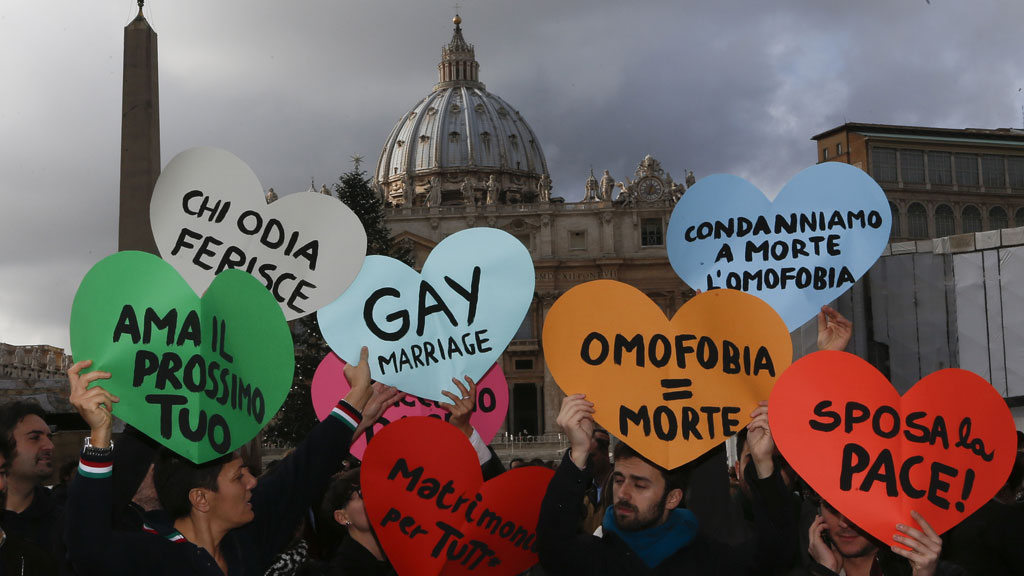The Vatican through the eyes of young, gay Catholics
In a review of its teachings on the family and sexuality, Catholic bishops say gay people have “gifts and qualities to offer”. A sign the church is adopting a more welcoming attitude to homosexuality?

The 200 bishops have been meeting in a synod convened by Pope Francis, whose choice of words when he talks about homosexuality could not be more different from his predecessor Benedict.
While Benedict described gay relationships as “intrinsically disordered”, Francis memorably said: “If a person is gay and seeks God and has good will, then who am I to judge him?“
In a preliminary report, the bishops go further, posing the question: “Are we capable of welcoming these people, guaranteeing to them a fraternal space in our communities? Often they wish to encounter a church that offers them a welcoming home.”
There is no suggestion that the church’s line on gay sex and marriage will be reviewed – Pope Francis maintains marriage is a union “between a man and a woman” – but change appears to be in the air.
Alex McFadyen
Alex McFadyen, a 22-year-old student from Amersham, Bucks, who describes himself as a “severly lapsed, gay Catholic”, believes “Pope Francis has opened the topic up to debate, broken with the staunchly conservative, traditional tone set by his predecessors and offered some positive words to the gay community”.
One of the reasons he stopped going to church was its stance on homosexuality. He told Channel 4 News: “I remember being in services where homosexuality was likened to alcoholism, and spoken of as an affliction that required compassion, but was ultimately damaging and pitiable.
“In time, I hope that the church will come to recognise the fact that gay people are a varied, vibrant, often misunderstood or mischaracterised community with a lot to offer to society and, by extension, the church.”
Mr McFadyen said he hoped that, in future, the Catholic church “will acknowledge that its words and actions have been damaging to gay people, especially the young, both in terms of adding to internal feelings of alienation, depression and self-loathing, and in terms of justifying or even encouraging homophobia within the family and society as a whole”.
John Carmody
John Carmody, 33, from Limerick city, said that while some gay rights groups had welcomed the language in the bishops’ statement, he was “insulted” and “a bit unfuriated” by it.
“It’s almost as if LGBT (lesbian, gay, bisexual, transgender) people had a disease like leprosy, as if they’re from another planet,” he told Channel 4 News.
“When they talk about good qualities, they’ve got to remember LGBT people are part of society, and this sets us spart from other people. They’re still completely out of touch with LGBT people, still very much off the mark.
“We are no different from anyone else in the world, but they’re looking down on people, saying, ‘You’re not human beings, but we are.’ Looking at those statements puts me off the church.”
Mr Carmody, who works in public relations, said he used to go to church “religiously”, but had cut back after becoming angry with the way gay people were portrayed. “I thought, ‘Am I wanted in church? Should I sit at the back?'”
Ania Kowalski
Ania Kowalski, 25, a PhD student from Norwich, said the church was saying for the first time that gay people could have committed relationships, and “by admitting this, they’re saying these people have a role in our church”.
She told Channel 4 News: “It’s the first time they’ve recognised so explicitly that we have gifts and qualities to offer, that there’s some good in gay relationships. They talk about problems with gay relationships, but also say that there’s some benefit in these relationships.
“But it’s not going far enough. I welcome the fact they’re talking about gay people because this hasn’t happened before, but I’d like the church to be more definite.”
Ms Kowalski said she had spent her “whole life” trying to reconcile her sexuality with her faith, which had been “really hard”.
She had drawn support from individual priests, “who I know are gay themselves”, but had also been through dark periods when she “prayed not to be gay”.
What she could not accept was “believing I would have to be alone all my life. I realised I couldn’t make that choice”.